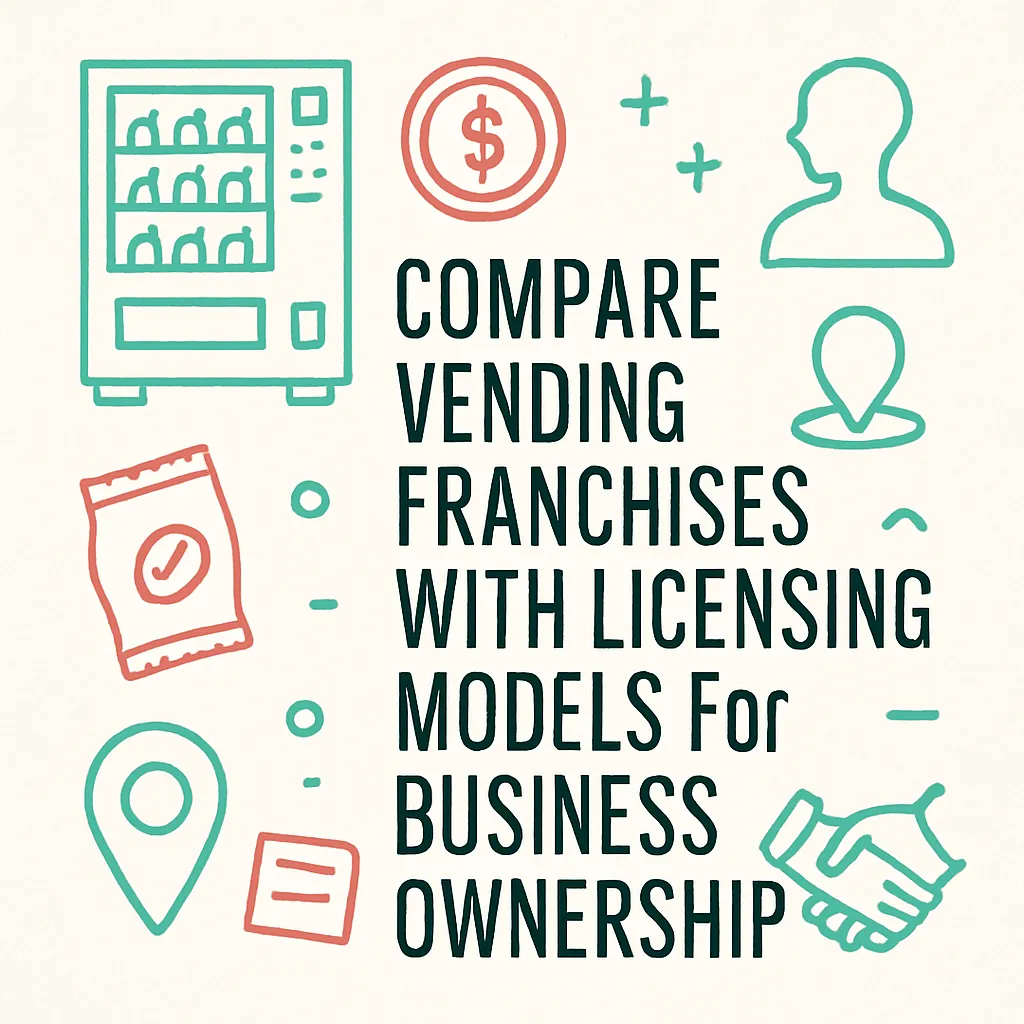Vending Franchise vs Licensing Agreements: What to Choose?
Compare vending franchises with licensing models for business ownership.
Back to Vending Franchises ResourcesCompare vending franchises with licensing models for business ownership.
Back to Vending Franchises ResourcesStart your 30-day free trial and get instant SMS and email alerts whenever a local business needs vending service. These are real location leads to help you grow your route — you decide which ones to buy, no obligations or contracts.
![]() Franchises offer established brands and comprehensive support networks.
Franchises offer established brands and comprehensive support networks.
![]() Licensing agreements provide greater flexibility and independence.
Licensing agreements provide greater flexibility and independence.
![]() Understanding the differences is key to choosing the right vending model.
Understanding the differences is key to choosing the right vending model.
30 days free, then $39 / month.
No Commitment. Cancel Anytime.

When entering the vending industry, entrepreneurs often face a critical choice: pursue a vending franchise or opt for a licensing agreement. Both models offer a pathway to business ownership but differ significantly in terms of structure, support, cost, and operational freedom. Making an informed decision requires a clear understanding of each model's intricacies.
A vending franchise involves purchasing the right to operate a business using an established brand’s name, business model, and trademarks. In return for an initial franchise fee and ongoing royalties, the franchisee typically receives comprehensive support. This often includes initial training, marketing materials, site selection assistance, access to proprietary technology, and ongoing operational guidance. The benefit is often a reduced risk due to leveraging a proven system and recognizable brand. However, this comes with less autonomy, as franchisors impose strict guidelines on everything from product selection to machine appearance and marketing strategies. To fully grasp the commitment, reviewing questions to ask before signing a vending contract is crucial.
In contrast, a vending licensing agreement grants an individual or entity the right to use another company’s intellectual property (like a product type or a particular technology) for a specific purpose, usually for a set fee. Licenses typically offer significantly more operational freedom than franchises. A licensee can often choose their own machine types, product mix, and branding, allowing for greater customization to meet local market demands. The initial and ongoing fees are generally lower than those for a franchise, and there are fewer stringent rules about how the business is run. This model appeals to entrepreneurs who prefer more control over their business choices and are confident in their ability to build a brand independently. For those new to the business and seeking insight, learning what to know before starting a vending business can guide this decision.
The choice between a vending franchise and a licensing agreement fundamentally depends on your business goals, risk tolerance, and desire for independence. If you value a proven system, comprehensive support, and established brand recognition, a franchise might be the better fit, despite higher costs and less autonomy. If you prioritize flexibility, lower initial investment, and want the freedom to innovate and build your own brand, a licensing agreement could be more appealing. Understanding the legal agreements for either path is essential; consider consulting resources like common clauses in vending contracts to prepare.
Vending Exchange connects vending operators with real businesses actively looking for vending services—including traditional machines, AI coolers, and office coffee. Get instant SMS and email alerts when new opportunities are available in your area. No contracts or monthly fees—just buy the leads you want. Start your free 30-day trial today and grow your vending business on your terms.
A vending franchise typically involves strict operational guidelines, brand usage, and ongoing support from the franchisor, while a licensing agreement offers greater autonomy and less control from the licensor.
Franchises often come with established brand recognition, proven business models, training, and marketing support, which can reduce startup risks.
Licensing provides more flexibility in how you operate, select products, and brand your business, often with lower initial fees and ongoing royalties.
Yes, franchises generally require higher initial investments, including franchise fees, training costs, and marketing contributions, compared to licensing agreements.
Franchises usually dictate product lines to maintain brand consistency, whereas licensing allows the operator to choose products more freely based on local demand.
Franchisors exert significant control over operations, marketing, and often pricing. Licensors have less direct control, granting more independence to the licensee.
Franchises typically provide comprehensive ongoing support, including technical assistance, marketing, and business coaching. Licensing agreements may offer minimal or no ongoing support.
Franchises almost always involve ongoing royalty payments based on a percentage of gross sales, along with potential advertising fees. Licensing agreements might have a flat fee or no ongoing royalties.
A vending franchise is better for leveraging an existing, recognized brand name and customer base from the outset.
A licensing agreement is more suitable for entrepreneurs who want to develop their own brand, product mix, and operational strategies.